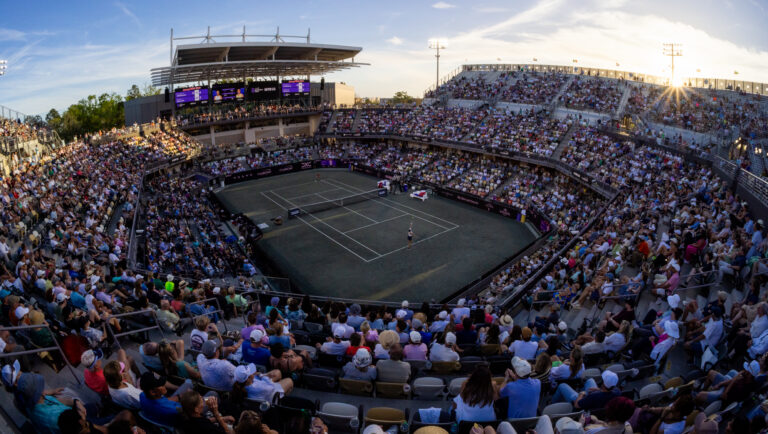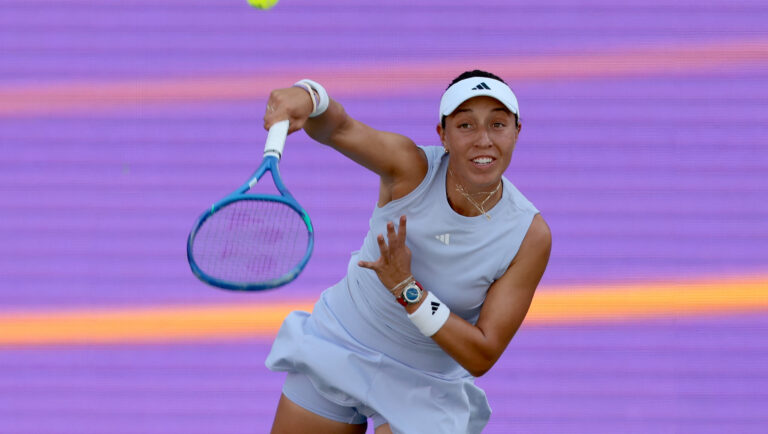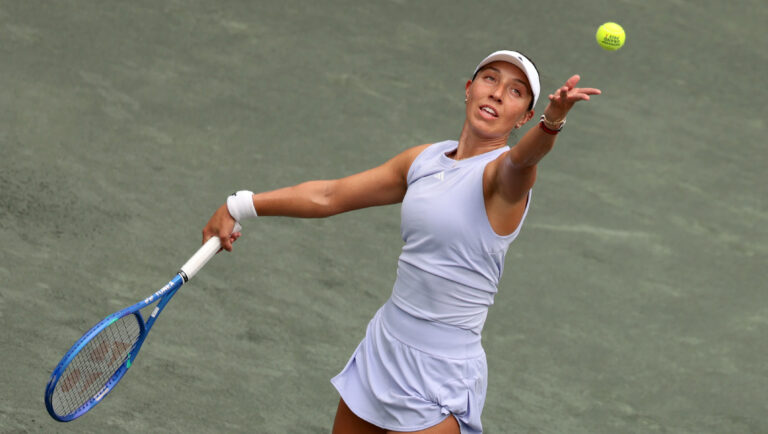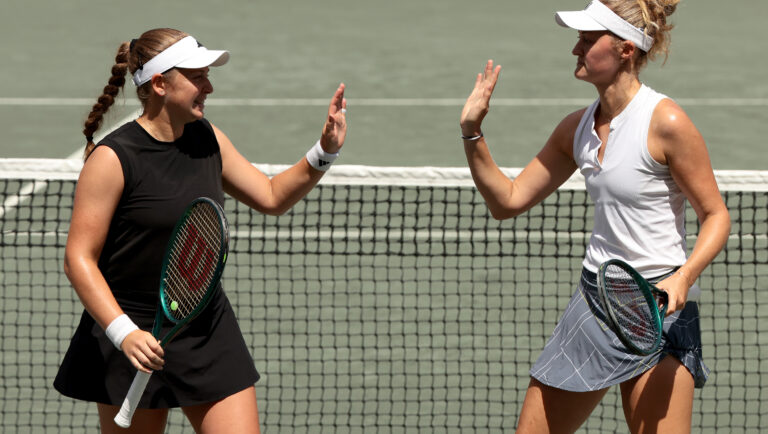Transcript: Jessica Pegula def. Iryna Shymanovich, 6-0, 6-3

Jessica Pegula def. Iryna Shymanovich, 6-0, 6-3
Round of 32
MODERATOR: Jess, congratulations, solid performance. Please talk us through your thoughts on your first match on clay.
JESSICA PEGULA: Yeah. Always tricky when it’s the first match. But thought I played pretty well. I mean, it was kind of a weird match. Felt like she obviously wasn’t playing that great at the beginning, but then she started playing pretty good tennis, and it got a little tricky there in the second. But, yeah, I’m happy that I was able to get through that second set. And, honestly, rather play a match like that than just win super easy and maybe she didn’t play well and I don’t feel like I got — had to change and problem slve throughout the match. So I’m happy I was able to figure it out.
I saw in the second set you were tossing the ball higher in your serve. Were you focusing on that?
JESSICA PEGULA: I was probably just like reiterating that the side, like when I was with the wind, the toss kept going like way out in front of me. So I don’t know what I was trying to tell myself, but the side with the wind I was just tossing way too far out in front. So it was probably just like a reminder to correct — bring it back a little bit because of the wind.
Doesn’t seem to be much of a Miami hangover. You talked about liking getting on these kind of streaks, getting a lot of matches in. How did you feel out there?
JESSICA PEGULA: Yeah. It’s always tricky first round, especially playing someone you don’t really know, someone that’s had a couple of matches already here on clay. I haven’t played against her before, didn’t know much about her. So I felt like it was just a little — couldn’t quite get my feet under me as far as like should I start pressing more, should I hang back and just kind of let her start missing and stuff like that. But as far as first match goes, I mean, I’m happy with the way I played. And working on some different things now switching to the clay, so I thought I was able to do that today, and whoever I play next, I think it will be a much tougher match with either Peyton or Ajla. They can play at a really high level. So it will be tougher, I think, tomorrow. But happy with just getting a win today.
There was a report today about a letter being sent from the Top 20 players on the tour to the Grand Slams about wanting more prize money. Can you talk about how that came together and as a Top 20 player why do you think that’s important?
JESSICA PEGULA: Yeah. I think that’s something I don’t want to talk about it too much, but it’s just something that we’re working with our PBR, the WTA PBR with, and hopefully we’ll have more information about that soon, but I don’t want to go into that too much just because, I don’t know, I shouldn’t.
And then different sort of topic. First, I think, ten matches and just finished have all been in straight sets today, and there have been a bunch of quick matches this tournament. I’m wondering if there’s something in the air at a tournament that leads to that or just purely a coincidence with a whole day…
JESSICA PEGULA: Yeah.
I just felt like do you sense in a tournament where it shifts one way or the other?
JESSICA PEGULA: I mean, I don’t know why, but that definitely happens. I felt like there was one day in Miami where everybody was playing the longest three-set matches. Today was kind of the opposite. I don’t really know why that is. I wish I could tell you, but I think sometimes, I don’t know what it is, maybe we’re all watching each other and then we all decide to do the same thing after watching each other play and going on afterwards. Yeah, it’s funny how sometimes days are just like that. They’re either super long or super quick.
You talked a little earlier in the week about proving doubters wrong, and I just wonder, what form does that arrive in for you? Where does that doubt manifest itself?
JESSICA PEGULA: Yeah. What did I say? I don’t remember what you’re talking about.
During the media day. Just saying you showed some people that you could have a successful, consistent career.
JESSICA PEGULA: You mean like peaking a little bit later on in my career, like that type of stuff? Sorry. So what was your question?
So how does that manifest itself? Where do you hear that doubt? I mean, does it come from within?
JESSICA PEGULA: I don’t know where I hear it. Maybe I make it up in my head. That’s also possible. I don’t know. I think sometimes you just get a sense of, like, you know, when you’re playing, there’s a next crop. Maybe you’re not the one getting the wildcards. Maybe you’re not the one that has the hype around them. And that’s fine. I never like to be the person with all the hype anyways. I think that’s made for a certain kind of person and I don’t think that person is me. But I think that I was able to just embrace and use it as motivation that maybe people had already like written me off or maybe I peaked or maybe I maxed out at my potential, and I just always took that more of just a challenge of just always wanting to get better and to always improve. And I never thought that, like, I’ve reached my full potential. Like I always thought there was so many things I could get better at and so many things that I could do or add to my game that maybe people didn’t think I had or something like that. So I think it’s a little bit of just me motivating myself. And it’s not like someone directly told me that. I think it’s just kind of the feeling that you get when you’re just — maybe you feel like you are plateauing a little bit in the rankings. I don’t know, there’s just not a lot of hype around you, so you kind of assume everyone’s just kind of maybe thought you reached your potential where you’re at. I don’t know. So maybe it’s more just me making it up in my head.
During the second set when she took the injury timeout, was it hard to reset?
JESSICA PEGULA: Everybody I played in Miami took an injury timeout. So I was like let’s just keep it going every single match. The only one that really didn’t was like Aryna and I lost. So I just take it as, like, maybe it’s a sign that I’m going to win the match. So no.
Coming in as the top seed, how does that change your mentality and your rhythm, if it does at all?
JESSICA PEGULA: Doesn’t really change much. I mean, I think there is even more pressure maybe, just because people see the one next to your name and expect you to win. But I mean, there’s not much difference between me and Madi at the second seed. It’s one ranking spot, or the next person after that. We’re all playing some really good tennis, and I feel like this draw is pretty stacked, and we’ve all had some really good tournaments this year as far as me or Madi or Belinda or Ashlyn Krueger or Kalinskaya and I just played a tough match, and she’s gotta play Madi now in the third round. There’s so many good players, so me it doesn’t really mean much. It’s cool. It’s cool if you win the tournament and you can say you were the one seed and you won the tournament, but there’s so much stuff now I don’t think it matters that much.
There’s a big uptick in number of 500 events, something like 12 to 18. How does that affect things, that change, how you approach a tournament like this? And also kind of a big range of fields in those 18 events as well.
JESSICA PEGULA: Yeah, yeah. There’s definitely, I think, since a lot of the tournaments decided to upgrade and all this is fairly recent and new, it’s kind of like getting a little bit of a grip on which weeks are going to be tough, which weeks aren’t going as tough. I remember playing Berlin last year, it was like everybody in the Top 10 was entered, and it was crazy. Here I feel like the draw is also really, really strong, considering it’s the first week and we’re on green clay in the U.S. But, yeah, it’s interesting when that kind of shifts. I mean, the 500s are so tough because the draws are usually a little smaller, so you’re playing someone really good first or second round already. I think it’s almost just as hard to win those as it is to almost win 1000 in a sense just because you don’t have a lot of time to kind of get your game under you. You just have to go out there and play a top seed kind of right away. So that always makes it different and I think tough, but yeah, it’s just a little bit of an adjustment knowing that maybe more tournaments like that you just don’t have as much time to kind of work your way into a draw.
Have you ever tried to intentionally schedule on that, knowing you might be at an easier place to scoop up points?
JESSICA PEGULA: I mean, maybe, yeah. I think some people do that, if you want more matches or you know it’s going to be weaker. For sure, there’s for sure girls that do that just for getting in qualifier main. They know, like Berlin — let’s just use that as example — is going to be really tough to get into. Stuttgart is really tough to get into. Girls have trouble getting into qualies there. So in that sense, for sure, you definitely look at which weeks are stronger and maybe not. But, yeah.
End of Interview
























 WTA Rank: 24
WTA Rank: 24